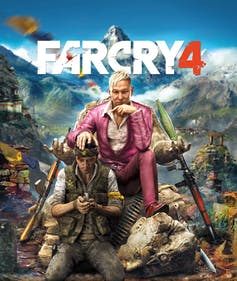Big games are often light on themes

Hitler’s mech as it appears in the original Wolfenstein game.
Id Software
Recently, I’ve found myself reacting quite strongly against games I haven’t played yet. Occasionally, to games that haven’t even been released yet. I’ve found myself immediately sceptical and hostile when a game’s marketing tells me that it has something to say “about” some serious theme or social commentary.
I’ve found myself immediately assuming that the game is not, in fact, going to say anything interesting about that topic at all. It’s an odd feeling, a pre-emptive hostility that I certainly didn’t used to feel towards games.
Last week, when Ubisoft released the cover art of their upcoming Far Cry 4 — a game we are yet to see any footage of — I echoed the many on Twitter who pointed out how the cover is clearly racist. There’s the man that many have perceived as Caucasian sitting on a throne, a cowering Asian man on his knees before him in an amazing literalisation of colonialism.
Some have defended the cover, at least insisting that we wait until we play “the game itself” before we start criticising. But as others still have pointed out, Ubisoft have deliberately released this cover to be consumed as a marketing text in its own right, and considering the series’ previous game’s own poor treatment of colonial and racist undertones, it was inevitable that such criticisms would be made.
Also last week, the new Wolfenstein game came out. When Id created the first Wolfenstein game in the early 90s, they established many of the conventions that still exist today in the first-person shooter genre. Now, like many older IPs, Wolfenstein demands a new, rebooted franchise every few years — just like Superman or Batman.
This time, developers MachineGames decided to take the alternate history route, asking what the 1960s would be like if the Nazi’s won world war two. There is a scene in the game where the player has to infiltrate a concentration camp. Now, again, I have not played Wolfenstein yet, but when I heard that this scene existed, I immediately balked at the idea of a blockbuster first-person shooter even considering depicting the horrors of a concentration camp.
It was a gut reaction that I’m interested in understanding. Obviously, as a game critic, I think videogames are no less able to tackle difficult or challenging topics than any other medium: if films and literature can say something meaningful about concentration camps, then surely videogames can, too? At the very least, at the risk of invoking Godwin’s Law, its been over a decade since several Australian developers created Escape From Woomera, highlighting the plight of refugees detained in Australia’s own interment camps, so surely it is possible to present Nazi concentration camps in a meaningful manner?
The obvious answer is “yes”. But why do I not trust Wolfenstein to be that game? It’s not because of a distaste for commercial first-person shooters, a genre that I voluntarily spend a lot of time playing. Maybe it is because it is a franchise that, in its first iteration, had a boss fight against Hitler riding around in a giant, Gatling gun-equipped mech that, when it blew up, showed a slow-motion replay of it blowing up a second time.
Maybe I just have little faith that a game where the main mechanical vocabulary is pulling the right trigger to fire a gun at someone’s head will be able to say something about the horrors of the Holocaust. Just like I wouldn’t expect Burnout, a game about spectacular crashes while street racing, to have something meaningful to say about the horrible consequences of speeding.
Is it that I don’t think blockbuster “triple-a” games are capable of big, mature themes? I am okay with an indie or “arty” games trying to tackle grim topics but if it is a blockbuster titles whose primary goal is to return a profit for its publishers, do I think it is too “tainted” to say much of anything? That seems like a problematic distinction, perpetuating a “high” and “low” brow divide across arty and popular games. Besides, I both enjoy and write about blockbuster games all the time, no less than I do indie games. Heck, I wrote an entire book about a triple-a game that was very clearly “about” something. That game, too, was a reinvention of a long-running series. So why the double standard?

The controversial cover for the upcoming game, Far Cry 4.
Ubisoft
So why this scepticism I feel towards Wolfenstein’s concentration camp, Far Cry 4’s colonial overtones and, also, if I am being completely honest, Watch Dog’s commentary on surveillance culture (moments after it asks you register for Uplay, no doubt)? I think it’s that I’ve been burned by too many games in the last 18 months that feel front-loaded with “Themes”. That is, blockbuster games that before their release, have made a big deal about being about this or that topic. Except then, when they are actually released, they are just another conventional blockbuster title with just the faintest layer of Themes painted on top.
Bioshock: Infinite is perhaps the best example of such a recent game that I can think of. Before its release, it was deliberately marketed as a game about racism and American nationalism. Except when it came out, it didn’t actually have much to say about it at all. The extent of its engagement with these themes could be boiled down to “Hey, racism exists but maybe everyone is equally bad”. Or Grand Theft Auto V, a game supposedly about “masculinity”, which has even less to say about anything than Bioshock: Infinite.
It’s part of a broader trend among blockbuster games to try to seem “mature” or “serious” by injecting some Themes without actually addressing them on anything more than a surface level. These are games that are “mature” or “serious” in the same way I thought Marilyn Manson was mature and serious when I was fifteen because he swore a lot. They are commenting on these themes to the extent that they are acknowledging that, yes, these are things that exist. That’s it.
And, sadly, I’ve come to realise that this has altered my expectations of any blockbuster game that markets itself as being about any one particular thing. I now expect such themes to be the thinnest veneer that can be waved around in marketing material with no deeper analysis or engagement with them. It’s perhaps why the blockbuster games that I think are most successfully about something (Driver: San Francisco, Binary Domain, Bulletstorm) do so without trying to convince me beforehand that they are about anything in particular. It just emerges as I engage with them over time.
To stress, the problem isn’t that games must be really meaningful to be important. There is absolutely nothing wrong with a game “just” being fun to play, even being slightly ridiculous. That is completely fine. But I want games to own that, to be confident about their desire to be “just” fun without an airbrushing of themes on top. Either tackle larger themes, or don’t. I thirst for that confidence of direction.
Of course, presumptions are usually unfair. Tomb Raider, for instance, caught a whole heap of slack for seemingly revolting depictions and suggestions of sexual violence before the game was released, unhelped by the executive produce saying in an interview how they wanted players (presumed to be male), to “protect” Lara, not “be” Lara. Yet, when the game came out, it was a largely refreshing game about an empowered young women protagonist standing up for herself. It wasn’t perfect, but it was far less problematic than the pre-release material suggested. This isn’t to say the pre-release criticism was misguided, but that sometimes blockbuster games can surpass that understandable scepticism.
So maybe one day when I play Wolfenstein or Far Cry 4 or Watch Dogs I’ll find myself eating my own words and accepting that they dealt with their respective themes in a mature and intelligent way. It’s entirely possible. But for now, I guess I just feel very sceptical and cynical towards big game releases that present themselves as “about something” when, so often, it turns out to just be a marketing tactic.








